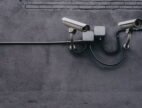10 Internet Security Tips Everyone Should Be Practicing
by Mashum Mollah Business Security Systems Published on: 09 August 2018 Last Updated on: 17 May 2025

The online world can be scary.
You’re sharing your personal information with a myriad of websites and online resources. You may feel at ease when these websites say they have a secure website. But hackers can outsmart their security system easier than you think.
Fortunately, there’s no reason to fret. As long as you practice good online cybersecurity techniques, your personal data shouldn’t fall into the wrong hands.
Internet security is something you should take very seriously. But how do you keep personal information secure from hackers and online criminals? Follow these 10 tips to prevent an attack and to use the internet safely.
1. Only Visit HTTPS Websites :
When you visit a website, do you ever look at the beginning of the URL? You will either see “HTTP” or “HTTPS.” If a website asks for your personal information, only provide the information if the website begins with HTTPS. Green padlock in the browser before https is also website security signal for the website which also displays before website url if website is secured through best SSL certificate. SSL certificate helps to stop hackers to breach data during information transfer between web server and web browser because it transfer data in an encrypted form.
2. Only Use Impossible Security Questions :
When you sign up for any new account, the website usually offers security questions. These questions are there to add an extra layer of security to your account.
You answer these questions if you forget your password. You may even need to answer these questions whenever you sign in.
But here’s where a security breach can occur: most people answer these questions truthfully. Let’s say one of the questions is where you graduated from high school. You’ll likely answer with your high school’s name.
Answer with something random, such as the answer to another question. Let’s say another question was your oldest sibling’s name, answer the high school question with your sibling’s name.
For more security, answer the question with an incoherent answer. Use a combination of letters and numbers.
3. Don’t Use the Same Password for All of Your Accounts :
You likely have multiple different accounts of many websites. Don’t make the mistake of using the same password for all of the same accounts — especially your bank account or other sensitive websites.
Are you unsure you’ll remember all of these passwords? Keep a tab with all of the passwords written. Keep it at your desk or in your wallet so you always know where it is.
There are also password apps that generate and save your different passwords.
4. Keep Your Operating System Up-To-Date :
It’s easy to moan and groan if we need to work on our computers, only for your computer to randomly installing updates. But this hour or so of inconvenience can protect your identity.
One of the main reasons why software constantly updates is to install multiple security software. Operating systems such as Windows and Mac inform their customers of the latest security settings they provide.
Always pay attention to these updates and be glad when the random updates start installing.
5. Don’t Access Public WiFi :
Going to coffee houses and chain restaurants to use their internet is popular with many people, especially remote workers, and students. But this is ill-advised; even if you don’t have internet, you should avoid using public WiFi at all costs.
Since you’re on a public WiFi system, anyone can intercept your data. This is why public WiFi is a breeding ground for hackers.
If you still want to use public WiFi, take security precautions. Turn off file sharing and don’t provide any passwords unless you’re connected to the best VPN.
6. Be Cautious With Social Media :
Today, social media users love posting their location and posting about their adventures. But you shouldn’t be too public on social media. Criminals love these posts because it reveals where you are and what you’re doing.
Hackers are extremely smart and are great at accessing social media profiles.
They use the information you post on social media and use it as access to your accounts.
Need further proof? Think back to point #3 about security questions. A hacker can easily find your personal information on your social media channels.
7. Never Open Email Attachments :
How often do you receive emails with attachments and open them like it’s nothing? This is the easiest way for hackers to compromise your system.
You’ll mainly receive these emails from an unsolicited person. But if a hacker compromises the system of someone you know, they can email you the same attachment they sent that person.
If an email looks suspicious or you have a bad feeling, don’t open the email or the attachments. If you receive a suspicious email from someone you know, text or call them and ask if they sent it.
8. Don’t Plug in Suspicious USB or External Hard Drives :
Did someone randomly hand you a USB drive? This is a popular promotional marketing technique. Students also share assignments and class information with external hard drives.
But make sure you know where the hard drive came from — this is an easy way for hackers to attack your system.
9. Don’t Lose Your Computer :
The worst security measure you can take is losing your computer. No matter how much virus and malware protection your computer has, a hacker can easily hack your computer if they have your computer.
10. Be Cautious About Downloading Anything :
Do you remember the torrent craze when people downloaded music and movies online? These files were loaded with viruses and malware.
If you download anything, know where the source came from. Trusted sources, such as Apple and Google, have high security. Even small business programs can easily be compromised.
Time to Practice Good Internet Security Strategies :
After reading this guide, are you now more aware of internet security?
Good — you should be. But as long as you use these tips, you’re safeguarding yourself from hackers. Always be wary of giving away your information and use great security programs as much as possible.
For more business and security tips, visit our resources.
Read Also :



































































































